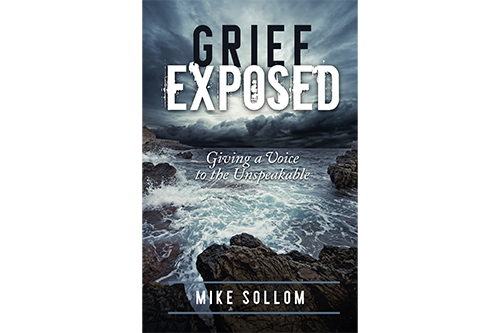
By Mike Sollom
In those dreadful days and nights as Mike collided with the morbid memories of his son’s suffering and death—and the unbearable ache of Jim’s absence—he needed a way to describe the anguish of his heart. So, he found a spiral-bound notebook and wrote. And wrote and wrote and wrote.
Mike believed if he could find the right words—give a voice to the unspeakable—he might also find a way to endure the pain. If he could expose those words of grief to the light, it might make the whole thing bearable. Many of his words were dark and raw and angry and did little more than chronicle ten interminable years of wrestling and railing. But many revealed islands of hope and yes, rays of light.
Through the generous encouragement of friends, Mike came to wonder if those words of light, which he discovered in the darkest of nights, might also help others endure the unbearable realities of their pain and loss. Could they give voice to someone else’s grief? If so, then they couldn’t remain buried in a stack of spiral-bound notebooks.
Before You Begin
What you are about to read is an honest description of what it was like for me to grieve. It’s a personal confession of what deep loss can do to the human soul—what it did to my soul. It’s not a prescription for how I think you should endure the grief and loss in your life. It’s a description of how I’m trying to endure mine.
Everything was written in “real time” over the course of ten years. Whatever I was thinking at any given moment, I wrote down. I have not attempted to rearrange my writing into chronological order or reconstruct it according to themes or topics. I have flashed back and forth in time but done so without warning. I have, in fact, done very little to assist you or guide you as you read. I don’t apologize for that. Grief and loss are not linear, nor do they adhere to logic. They are inconsistent, unpredictable, and messy.
The words that follow were not written to be read. I did not intend that anyone would see the squalls and scribbles that boiled up from the emptiness in my soul. As I sat in dimly lit booths in random coffee shops or wrestled through sleepless nights in my own home, my only intention was to rage against my loss and release the raw emotions of my grief. In the end, I didn’t write what might be true for everyone. I wrote what was true for me.
I began writing in a blog to inform loved ones of the ups and downs of my son, Jim’s, battle against cancer.
Jim did not survive.
After he died, my words turned rough and raw, and I could not hide the honesty of my baffled and broken heart.
I stopped writing that blog, but I continued to write in a journal. What you hold in your hands are excerpts from that journal. It’s what happened after Jim died. Those blog entries were the chronicles of a warrior son—my son. This journal is the journey of a wounded father—my journey.
-
 Grief Exposed$9.99 – $14.99
Grief Exposed$9.99 – $14.99
The Wound Goes Deeper
It has been one month since my son was severed from my side. The wound is larger and more raw than ever. I didn’t know what to expect. I wondered if the “time-heals-all-wounds” salve would soon be making its way to this gaping hole in my heart. It is not. The wound is deeper now, more vulnerable, and far more sensitive.
I used to tell Jim, and all my kids, when they started a new job or a new class at school—filled with apprehension about all the unfamiliarity—to be patient. “Just wait a month,” I’d say. “It takes about a month and then everything will start to feel familiar and comfortable.”
This is not like that.
Nothing feels familiar or comfortable. My son is gone. Jim is completely gone. There will never be a familiar or comfortable feeling with which to embrace this emptiness.
There is a permanence about this that—regardless how hard I fight—engulfs me. Jim isn’t going to come rumbling into the driveway with the music in his Jeep pounding out its familiar beat. He isn’t going to come rambling into the room with news of what he has just decided to do with the rest of his day. He isn’t going to come ambling down the stairs, looking like he just stepped out of a fitness magazine, and greet me with that beautiful smile and his bright, “Hi, Dad.”
My son is gone, and I cannot bear his absence.
-
 Grief Exposed$9.99 – $14.99
Grief Exposed$9.99 – $14.99






